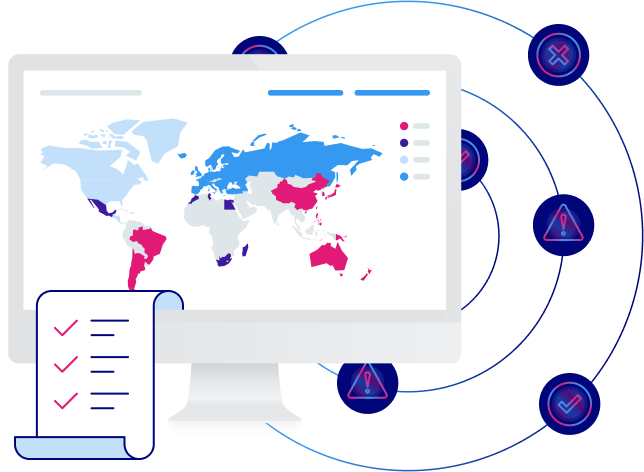-
Solutions
- AI Governance
- Geo-Specific Cookie Banner
- Consumer Preference Management
- Data Subject Request Automation
- Data Mapping and Vendor Risk Management
- Privacy, Vendor, and Risk Assessments
- Privacy Program Management
- Regulatory Guidance
- Privacy Program Consulting
- Certifications and Verifications
- International Data Transfers
Forrester TEI ROI of Privacy ReportTrustArc commissioned a Forrester study to analyze the potential benefits of using our platform and the Forrester team found ROI linked to efficiency, compliance, and decreased cost in data breaches.
Read the report -
Products Products Consent & Consumer Rights Overview
Experience automated privacy solutions that simplify compliance, minimize risk, and enhance customer trust across your digital landscape.
- Cookie Consent Manager Effortlessly manage cookie consent for global compliance, ensuring a secure, personalized browsing experience.
- Consent & Preference Manager Easily manage customer consent across brands and platforms—email, mobile, advertising—with a centralized repository.
- Individual Rights Manager Automate and streamline DSR workflows to ensure compliance and show your commitment to customer rights.
- Trust Center Quickly centralize, manage, and showcase all trust and safety information in an easily customizable, no-code hub.
Products Privacy & Data Governance OverviewSimplify privacy management. Stay ahead of regulations. Ensure data governance with cutting-edge solutions.
- PrivacyCentral Centralize privacy tasks, automate your program, and seamlessly align with laws and regulations.
- Data Inventory Hub & Risk Profile Gain full visibility and control of your data and accurately identify and mitigate risks.
- Assessment Manager Automate and score privacy assessments like PIAs and AI Risk, streamlining your compliance workflow.
- Nymity Research Get instant access to the latest in privacy regulations, legal summaries, and operational templates.
Products Assurance & Certifications OverviewBoost brand trust with TRUSTe's certifications, showing your privacy commitment with the most recognizable seal, assessed by unbiased experts.
- Dispute Resolution
- TRUSTe Enterprise Privacy Certification
- TRUSTe EDAA Privacy Certification
- TRUSTe APEC CBPR and PRP Certification
- TRUSTe Data Collection Certification
- CCPA/CPRA Validation
- Data Privacy Framework Verification
- GDPR Validation
- Digital Advertising Alliance Validation
- TRUSTe Responsible AI Certification
-
Regulations
- EU General Data Protection Regulation (GDPR)
- California Consumer Privacy Act (CCPA)
- Virginia Consumer Data Protection Act (CDPA)
- NIST AI Framework
- ISO/IEC 27001
EU Artificial Intelligence Act (EU AI Act)EU's regulation on the use of AI and the world's first comprehensive AI law.
Learn moreData Privacy Framework (DPF)Transatlantic data transfer mechanism for EU-U.S., UK, and Swiss-U.S. commerce.
Learn more - Resources
- Contact us
Personal Data Protection Act (PDPA)
The PDPA complements sector-specific legislative and regulatory frameworks, governing the collection, use, disclosure and care of personal data in Singapore.
Are you subject to the PDPA?
PDPA is highly localized and centered in Singapore, it applies to any international business that operates or does business in the Republic. Additionally, international businesses that do transactions with employees or customers in Singapore are mandated to follow the Personal Data Protection Act’s guidelines. PDPA does not apply to:
-
Any individual acting on a personal or domestic basis.
-
Any individual acting in his/her capacity as an employee with an organization.
-
Any public agency in relation to the collection, use or disclosure of personal data.
-
Business contact information such as an individual’s name, position or title, business telephone number, business address, business email, business fax number and similar information.
Obligations under PDPA
Purpose Limitation
Businesses must be transparent when it comes to informing individuals as to why their personal data is being collected, how it will be used, and in which cases personal data will be disclosed. Furthermore, businesses must not use data for any other reason than its stated purpose.
Notification and Consent
Inform the individuals on the purposes for collection, use and disclosure of their personal data during collection and ensure that the consent has been obtained from the individuals before collecting, using or disclosure of the personal data.
Individual Rights
Upon request, provide the personal data of the individual and information on how the individual’s personal data has been used or disclosed in the past year. Correct an individual’s personal data upon request.
Retention Limitation
Retain personal data only for business/legal purposes and securely destroy personal data when no longer needed.
Cross-Border Transfers
Ensure overseas external organizations provide a standard of protection comparable to the protection under the Singapore PDPA.
Do-Not-Call (DNC)
Do not send marketing messages to individuals who have registered in the National DNC registry through voice, text messages or fax unless you have obtained their clear and unambiguous consent or have an on-going relationship (for text / fax).

CBPR – Navigating Cross-Border Data Privacy Compliance
In this highly anticipated webinar, we explore the background the future direction and assess the potential business case for companies considering certification under the new Global CBPR System.
Achieve compliance
-
Privacy program development and compliance management Identify gaps and track compliance with PrivacyCentral – assess Singapore PDPA regulation specifics and automatically get recommendations to close compliance gaps.
-
Record consent Easily honor customer privacy preferences at every touchpoint with TrustArc’s Consent and Preference Manager across all your applications, domains, mobile apps, and connected TV.
-
Complete and maintain a data inventory Automate with TrustArc’s Data Inventory Hub. Save time and reduce risk with automated data flow mapping, risk analysis, and remediation for personal data processes and data transfer risks.

The information provided does not, and is not intended to, constitute legal advice. Instead, all information, content, and materials presented are for general informational purposes only.




